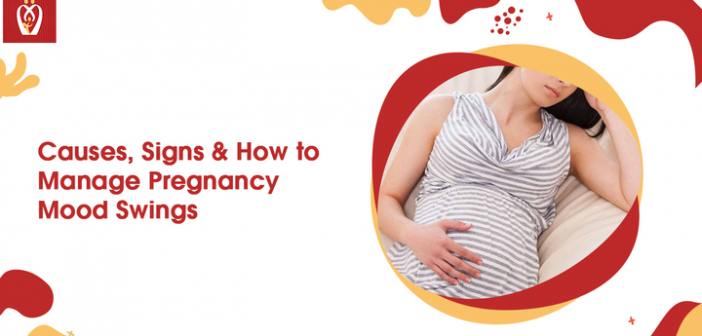Were you moved to tears by a toilet paper commercial? Have you ever yelled at your partner because they forgot to buy milk? It’s not uncommon for your moods to rise and fall during pregnancy. Here’s why pregnancy mood swings happen, how to deal with them, and warning signs that you’re dealing with something more serious. Talk to your GP or midwife immediately if you don’t feel like yourself. You can use the Nurturey pregnancy app to book a GP/midwife appointment.
What are pregnancy mood swings?
Pregnancy mood swings are similar to mood changes many women experience before their periods. You may feel happy at one moment and sad, angry, or anxious the next. Or you may have big feelings about things that usually do not arouse such strong emotions.
While your erratic mood swings may frustrate you, these emotional ups and downs are a completely normal — and even expected — part of being pregnant.
What causes mood swings during pregnancy?
Hormones are at least partially to blame for your emotional rollercoaster. During pregnancy, the body produces more estrogen and progesterone, which can cause moodiness and other unpleasant side effects such as nausea and fatigue.
But it’s not all about biology. Aside from hormones, it’s no surprise that your emotions are so fragile now that you’re expecting: Consider all of the ups and downs you’ve experienced. One minute you may be ecstatic about becoming a mother, and the next, you may be terrified. Know that these emotions are normal and that you will be an excellent parent.
When do mood swings in pregnancy start?
Emotional turmoil is most common during the first trimester when your body is trying to adjust to changing hormone levels. For some women, mood swings are one of the first signs of pregnancy, beginning as early as week four.
Many pregnant women report that their mood swings begin to even out as their pregnancy progresses, only to return as their due date approaches. Others reveal that their moods remain more sensitive throughout their pregnancy, which is normal.
Pregnancy mood swings: How to Manage Them
Mood swings are normal during pregnancy, but there are ways to get back on track. You may try these methods.
Relax and enjoy the ride.
Mood swings are a natural part of pregnancy, so if you’re going through it, don’t worry.
Try to boost your downs.
Find things to cheer yourself up when you’re feeling down. For instance, get an additional hour of sleep, get a manicure or a prenatal massage, enroll in a prenatal exercise class, or organize a romantic meal with your partner.
Lean on your partner for support.
They’ll be along for the ride, so share your emotions with them, including your anxieties, concerns, and joys. Let your partner know what they can do to help.
Don’t forget to have snacks.
Eating regular snacks in between meals containing protein and complex carbs, such as a cheese stick and a handful of trail mix, may help stabilize your emotions. A sugary treat, such as a chocolate bar or a doughnut, may provide a quick pick-me-up, but it will also cause a sharp drop in blood sugar, bringing you crashing down soon after.
Prioritize self-care.
Make time for regular exercise, enough sleep, eating healthy, filling meals and snacks, and limiting sugary junk food.
Wherever possible, eliminate stress.
Having a baby is a huge life change, so try to keep the rest of your life as calm as possible. Make time for stress management techniques such as journaling, meditation, yoga, regular baths, or even just taking walks. And try not to overburden your plate with commitments.
Connect with others.
Consider taking a prenatal exercise class, joining a support group, or enrolling in a childbirth class. Meeting other expectant mothers is a welcome reminder that you are not alone in your feelings.
Attend all your prenatal appointments.
Regularly seeing your GP allows you to discuss your concerns as they occur, allowing them to fade from your mind. It will also feel good to know that you are doing everything possible to keep you and your baby healthy.
Get rid of the guilt.
People may expect you to be overjoyed about your pregnancy all the time, but that is unrealistic. Don’t feel bad if you have conflicting feelings about being pregnant or becoming a parent. You’re going through a big life transition, and all of the emotions that come with it are 100% normal.
When should you consult your GP about mood swings during pregnancy? | pregnancy app
Some ups and downs are considered normal during pregnancy. Severe or constant changes in mood that hamper daily life, on the other hand, may be symptoms of pregnancy depression or anxiety. Talk to your GP/midwife if you have any of the following symptoms:
- Becoming depressed, irritable, or angry
- Agitated or having difficulty concentrating
- Scared or panicked
- Changes in your sleeping or eating habits
- Lack of interest in activities you usually enjoy, or the sensation of going through the motions
- Extremely nervous about becoming a mother or concerned about the baby’s heart palpitations, rapid breathing, or muscle tension.
- Thoughts that are frightening or bothersome and do not go away
Taking steps to protect your mental health is vital as it helps you have a more enjoyable pregnancy. And you can give your baby the best possible start.
How Will the Nurturey Pregnancy App Help You?
The Nurturey PinkBook, the best alternative to the NHS RedBook, gives you access to your child’s health records, upcoming health checkups, and trusted NHS information relevant to your stage of parenting and pregnancy. Parents and pregnant women can also link their GP accounts to the PinkBook. As a result, you can schedule appointments with your GP if it’s hard to deal with pregnancy mood swings. Besides, you can reorder prescriptions and message your GP if you have questions about yourself or your child with the Nurturey pregnancy app.
Conclusion
Mood swings are common during pregnancy, and you should not be concerned. Hormonal changes, morning sickness, a lack of sleep, and other factors can all play a role. Taking care of your psychological and physiological health and practicing stress management techniques may help you overcome the condition. These will keep your mood swings in check and allow you to enjoy your pregnancy.







